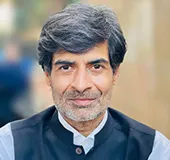
From ISIS attaching a GoPro camera to a home-made armed drone in Syria to Islamists from the Democratic Republic of Congo uploading 4K videos pledging allegiance to Abu Bakr al-Baghdadi, cyberspace and emerging technologies are facilitating terrorist activities at an unprecedented scale. The convergence of technology and terrorism represents the worst kind of feedback loop between the real and the virtual. States, meanwhile, are struggling to respond to this convergence and to balance the imperatives of national security and the freedoms afforded in cyberspace.
Given the complex structural drivers of terrorism and the trade-offs involved in regulating technology, it is imperative that policy makers first assess the real and evolving dimensions of the challenge. The popular conceptual understanding of this menace is that like war, terrorism is simply politics by other means. Whoever the actor may be, terrorism is a violent expression of alternative political values and norms for organizing societies. Motivations may vary but violence is the principal instrumentality for recruiting, propagating and financing this perverse politics. And like mainstream politics, terrorist organizations have co-opted technology as a force multiplier in achieving their objectives.
Like mainstream politics, terrorist organizations have co-opted technology as a force multiplier in achieving their objectives.
As has been suggested by many scholars, terror requires spectacle to thrive and technology has allowed this opera of violence to find new audiences and locales. The
Christchurch shootings in New Zealand is perhaps the most obvious example — with the shooter streaming his actions live on social media. New communication platforms afford scale and impact at virtually no cost, a service that terrorists have used with impunity and agility over the years with deleterious consequences for communities and countries.
Some features of the internet, like end-to-end encryption and virtual private network (VPN) have made it easier than ever for terrorist organizations to find recruits and manage outreach and organization. For example, migration of pro-ISIS propaganda from likes of Facebook and Twitter to Telegram was in a large part due to encryption facility offered to all its users. Technology also allows these organizations to transcend the tyranny of geography. An organization in one country can raise funds, recruit and radicalize individuals in another part of the world with ease.
Some features of the internet, like end-to-end encryption and virtual private network (VPN) have made it easier than ever for terrorist organizations to find recruits and manage outreach and organization.
Every communication opportunity online is being exploited by these malevolent actors. From the mainstream platforms such as Facebook and Telegram to chat rooms, betting sites, porn websites and online gaming hubs. These virtual venues are fertile breeding grounds for accidental and purposeful recruits and for propagating violent narratives. The importance of ‘digital terror squads’ was emphatically asserted when, in 2016, ISIS granted its ‘
media mujahids’ the same rank as those fighting for the group on the ground. This gave the online radicals pride of place that was traditionally reserved for the fighters delivering carnage on the ground. This is only one of the instances that signify just how integral, sophisticated and important cyber operations are for terrorist organizations today.
Terrorist organizations are also leapfrogging traditional hawala networks to embrace Fin-Tech as a means to finance their operations. Services like e-wallets, digital currencies, crypto-currencies and even crowd funding platforms are being leveraged to raise and launder money and finance terrorist operations. This has rendered most current practices of clamping down on terror-finance obsolete, and today
more terror organizations have access to more money than ever before.
Terrorist organizations are also leapfrogging traditional hawala networks to embrace Fin-Tech as a means to finance their operations.
Amidst this worrying convergence of terrorism and technology, states have struggled to respond without threatening the infrastructure of cyberspace or the freedoms and opportunities it affords. Meanwhile, the tech platforms are having troubles of their own. The word ‘social’ in social media is under scanner, with platforms facing multiple headwinds relating to their policies on responding to terrorism, fake news and political interference among others. These platforms host billions of users even as they struggle to differentiate between their ‘social’ obligations to the digital commons and their commitments to markets and investors.
As states, platforms and grassroots organizations combat the threat of tech-enabled terrorism, it is important for them to identify certain guiding principles.
First, it is crucial that they do not unintentionally limit access to technology itself. For many states, the knee-jerk response to some of these challenges is banning access or shutting down tech-based routine operations altogether—as we recently saw in Sri Lanka. Instead, states must co-opt technology and tech-actors, which allows for better surveillance of and enforcement against terrorist activities. Legislations and notifications will have limited influence in this new battle theatre. More technology, better technology and skillful deployment of technology against malign actors is the most potent option for all to embrace and one which most governments have failed to invest in.
States must co-opt technology and tech-actors, which allows for better surveillance of and enforcement against terrorist activities.
Second, the digital commons must witness the creation of new mechanisms and institutions for international cooperation on this vital issue. The challenges of terrorism are cross border — making debates held hostage by ‘regional’ or ‘international’, ‘Western’ or ‘Eastern’ silos irrelevant. States and tech companies need to find new venues and forums to cooperate on these issues in an institutionalized manner, formally or informally. The traditional distrust between governments and private actors is creating a cleavage that allows terror to flourish and succeed.
The digital commons must witness the creation of new mechanisms and institutions for international cooperation on this vital issue.
Third, technology companies must be more forthcoming about disclosures relating to terrorist activities on their platforms. The obsession with the performance of their shares on the bourses is perversely impacting the global effort to respond to terror. They must create internal mechanisms to share information with law enforcement on a real time basis. They must also publish regular public reports detailing the nature of terrorist activities they have identified, and steps taken to counter them. The reluctance of corporations to be transparent about the mishaps on their platforms and networks is a serious problem.
Technology companies must be more forthcoming about disclosures relating to terrorist activities on their platforms.
Fourth, states, for their part, must remember that tech is only a tool. It is not a substitute for real world and virtual policing. Often states attempt to undermine tech—for example through weaker encryption norms due to their naïve assessment that this would assist in their dispensation of duty. This only undermines utility and safety of technology for millions of benign users; while terrorist organizations will simply migrate to alternative platforms as witnessed in the recent past.
States...must remember that tech is only a tool. It is not a substitute for real world and virtual policing.
Fifth, localized capacity building both by state and tech firms is the need of the hour. While national intelligence organizations are certainly relevant, the first line of defense against tech-enabled terrorism will be local law enforcement. Unless these units are equipped with skills and technology, the terrorist will always remain a step ahead in an upcoming era of Do-It-Yourself (DIY) terrorism.
Localized capacity building both by state and tech firms is the need of the hour.
Finally, simultaneous investments in capacity for strategic communications by states and technology companies is a pivotal step. Unless good actors can combat the narrative appeal of radicalism and terror, most responses with be feeble and patchy. Either the states provide purpose and meaning to individuals, or radical groups will. The old methods of counter-terror will need to be dramatically upgraded and redesigned. The terrorists have developed a lethal cocktail of clicks and Kalashnikovs, even as citizens, states and other organizations, lag behind in recognizing and responding to this heady mix.
Simultaneous investments in capacity for strategic communications by states and technology companies is a pivotal step.
Any good policy response to tech-enabled terrorism must acknowledge that combating it requires an “all of society” approach. This first line of defense is always communities, no matter how the technology may change. Platforms for their part must work with them alongside states to increase awareness about this real and present danger and must transparently share their propositions that can help to balance the trifecta of growth, rights and security.
The views expressed above belong to the author(s). ORF research and analyses now available on Telegram! Click here to access our curated content — blogs, longforms and interviews.



 From ISIS attaching a GoPro camera to a home-made armed drone in Syria to Islamists from the Democratic Republic of Congo uploading 4K videos pledging allegiance to Abu Bakr al-Baghdadi, cyberspace and emerging technologies are facilitating terrorist activities at an unprecedented scale. The convergence of technology and terrorism represents the worst kind of feedback loop between the real and the virtual. States, meanwhile, are struggling to respond to this convergence and to balance the imperatives of national security and the freedoms afforded in cyberspace.
Given the complex structural drivers of terrorism and the trade-offs involved in regulating technology, it is imperative that policy makers first assess the real and evolving dimensions of the challenge. The popular conceptual understanding of this menace is that like war, terrorism is simply politics by other means. Whoever the actor may be, terrorism is a violent expression of alternative political values and norms for organizing societies. Motivations may vary but violence is the principal instrumentality for recruiting, propagating and financing this perverse politics. And like mainstream politics, terrorist organizations have co-opted technology as a force multiplier in achieving their objectives.
Like mainstream politics, terrorist organizations have co-opted technology as a force multiplier in achieving their objectives.
As has been suggested by many scholars, terror requires spectacle to thrive and technology has allowed this opera of violence to find new audiences and locales. The
From ISIS attaching a GoPro camera to a home-made armed drone in Syria to Islamists from the Democratic Republic of Congo uploading 4K videos pledging allegiance to Abu Bakr al-Baghdadi, cyberspace and emerging technologies are facilitating terrorist activities at an unprecedented scale. The convergence of technology and terrorism represents the worst kind of feedback loop between the real and the virtual. States, meanwhile, are struggling to respond to this convergence and to balance the imperatives of national security and the freedoms afforded in cyberspace.
Given the complex structural drivers of terrorism and the trade-offs involved in regulating technology, it is imperative that policy makers first assess the real and evolving dimensions of the challenge. The popular conceptual understanding of this menace is that like war, terrorism is simply politics by other means. Whoever the actor may be, terrorism is a violent expression of alternative political values and norms for organizing societies. Motivations may vary but violence is the principal instrumentality for recruiting, propagating and financing this perverse politics. And like mainstream politics, terrorist organizations have co-opted technology as a force multiplier in achieving their objectives.
Like mainstream politics, terrorist organizations have co-opted technology as a force multiplier in achieving their objectives.
As has been suggested by many scholars, terror requires spectacle to thrive and technology has allowed this opera of violence to find new audiences and locales. The  PREV
PREV




